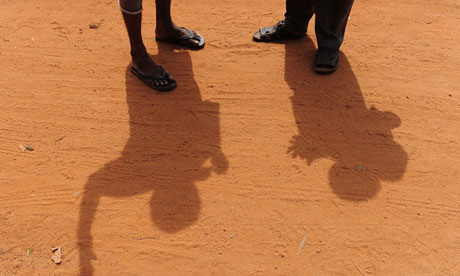SOURCE: The Guardian on Facebook
 Sexual and labour exploitation are the commonest reasons for human trafficking, but organ donors are also in demand. Photograph: Lakruwan Wanniarachchi/AFP/Getty Images
Sexual and labour exploitation are the commonest reasons for human trafficking, but organ donors are also in demand. Photograph: Lakruwan Wanniarachchi/AFP/Getty ImagesSunday 26 August 2012
First official study breaks down reasons for trafficking in UK
Th e first official assessment of human trafficking in the UK reveals the increasingly diverse reasons people are being smuggled into the country, including domestic servitude, sexual and criminal exploitation, and organ harvesting.
The United Kingdom Human Trafficking Centre's 2011 baseline assessment concludes that 11% of victims were trafficked for the purposes of domestic servitude; 1% for organ harvesting; 5% for multiple exploitation; 17% for criminal exploitation; 22% for labour exploitation; and 31% for sexual exploitation. The remaining 13% were trafficked for reasons unknown.
The report, which is compiled from information submitted by police forces, the Gangmasters Licensing Authority, the UK Border Agency and other organisations, suggests that last year some 2,077 potential victims of human trafficking were identified in the UK.
The picture that emerges contrasts strongly with the popular perception that trafficking is predominantly for the purposes of prostitution.
The assessment revealed that, "for the first time, two potential victims reported that they had been trafficked specifically for organ harvesting," and noted a third person was also suspected to have been trafficked for such a purpose.
According to the UKHTC, "the illegal trade is dominated by kidneys, which are in the greatest demand and are the only major organs that can be wholly transplanted with relatively few risks to the life of the donor".
Klara Skrivankova, Anti-Slavery International's trafficking programme co-ordinator, said: "The UKHTC 2011's assessment shows that more than 50% of trafficking in the UK happens for purposes other than sexual exploitation.
"The prevalence of trafficking for forced labour in industries like agriculture, construction or food processing is a problem we have been pointing to for a number of years. It is important that the law enforcement authorities now increase efforts to arrest those who profit from forced labour and ensure that all victims of trafficking see their exploiters brought to justice."
The five most common countries of origin for victims of trafficking were Romania, the Czech Republic, Slovakia, Poland and Nigeria.
The assessment reported evidence that 99 UK citizens were trafficked within the UK last year, of whom 52 were trafficked for sexual exploitation, with more than 80% identified as female children. However, an Observer analysis of trafficking figures recorded by the Serious and Organised Crime Agency's National Referral Mechanism database provides an alternative snapshot.
Between 1 April 2009, when the database started recording trafficked incidents, until March 2012, the latest set of figures available, some 2,445 people were suspected, or were found, to have been trafficked into the UK.
The figures reveal 1,566 were female, 596 were male and the remainder were children. Some 431 people were believed to have been trafficked from Nigeria, compared with 255 from Vietnam, the second most active trafficker of people to the UK. China was the third largest trafficker, responsible for bringing a suspected 224 people to the UK.
Europol, the international police agency, has identified Nigerian organised crime as one of the largest law enforcement challenges to European governments. In many cases, Nigerian victims are trafficked after a friend or family member offers a child a chance for a better life abroad.
On accepting the offer, the victim will have a "juju" ceremony performed by a witchdoctor to ensure success in their new life. Victims fear they will be magically harmed should they report their plight to the authorities, meaning the true scale of the abuse remains hidden.
A 2010 report by the Child Exploitation and Online Protection Centre identified the trafficking of Vietnamese children into the UK as another key trend. The majority were forced to work in cannabis farms, with others being exploited in brothels and nail bars, or pressed into committing street crimes such as selling illegally copied DVDs or breaking and entering.
The UKHTC assessment found many trafficked victims were told that they owed debts of up to €70,000 (£55,400) for their travel costs. It notes: "They are then subjected to labour exploitation, sexual exploitation or criminal exploitation until they are perceived to have repaid their debt. In some cases, the debt increases through a combination of high costs for food and accommodation and low wages, and the victim is unable to reduce or repay the money owed."


No comments:
Post a Comment